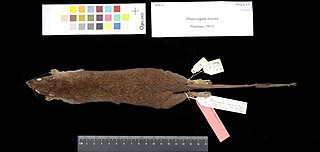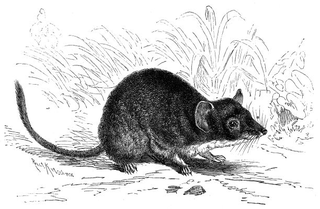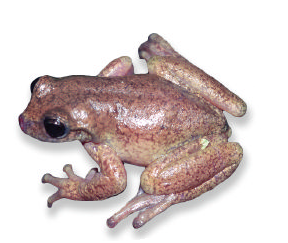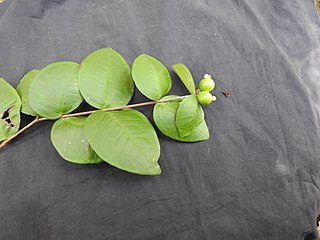
Murexia is a genus of mice-sized dasyure, in the marsupial order Dasyuromorphia. They are found in Papua, Indonesia and Papua New Guinea.

The Phascogalini are a tribe in the family Dasyuridae, comprising seven genera of small marsupials native to Australia and New Guinea.
This article is a list of biological species, subspecies, and evolutionary significant units that are known to have become extinct during the Holocene, the current geologic epoch, ordered by their known or approximate date of disappearance from oldest to most recent.

Villa's gray shrew is a shrew native to northeastern Mexico, where it is called musaraña.
Sarcohyla chryses, also known as the golden treefrog, is a species of frog in the family Hylidae. It is endemic to the Sierra Madre del Sur in Guerrero, Mexico. Its sister species is Sarcohyla mykter.

Sarcohyla mykter, also known as the keelsnout treefrog or keel-snouted treefrog, is a species of frog in the family Hylidae. It is endemic to the Sierra Madre del Sur in Guerrero, Mexico. Its sister species is Sarcohyla chryses.
Eugenia brevistyla is a species of plant in the family Myrtaceae. It is endemic to Brazil. Under its synonym Calycorectes australis, it was regarded as endangered, being threatened by habitat loss.
Eugenia fernandopoana Engl. & Brehmer, Bot. Jahrb. Syst. 54:337,1917, is a species of plant in the family Myrtaceae. It is found in Cameroon, Central African Republic, and Equatorial Guinea. Its natural habitat is subtropical or tropical moist lowland forests. It is threatened by habitat loss.

Eugenia singampattiana is a critically endangered species of plant in the family Myrtaceae. It is endemic to the hills around Singampatti and Papanasam in the state of Tamil Nadu in India.
Eugenia virotii is a species of plant in the family Myrtaceae. It is endemic to New Caledonia.

The World's 25 Most Endangered Primates is a list of highly endangered primate species selected and published by the International Union for Conservation of Nature (IUCN) Species Survival Commission (SSC) Primate Specialist Group (PSG), the International Primatological Society (IPS), Global Wildlife Conservation (GWC), and Bristol Zoological Society (BZS). The IUCN/SSC PSG worked with Conservation International (CI) to start the list in 2000, but in 2002, during the 19th Congress of the International Primatological Society, primatologists reviewed and debated the list, resulting in the 2002–2004 revision and the endorsement of the IPS. The publication was a joint project between the three conservation organizations until the 2012–2014 list when BZS was added as a publisher. The 2018–2020 list was the first time Conservation International was not among the publishers, replaced instead by GWC. The list has been revised every two years following the biannual Congress of the IPS. Starting with the 2004–2006 report, the title changed to "Primates in Peril: The World's 25 Most Endangered Primates". That same year, the list began to provide information about each species, including their conservation status and the threats they face in the wild. The species text is written in collaboration with experts from the field, with 60 people contributing to the 2006–2008 report and 85 people contributing to the 2008–2010 report. The 2004–2006 and 2006–2008 reports were published in the IUCN/SSC PSG journal Primate Conservation,, since then they have been published as independent publications.






